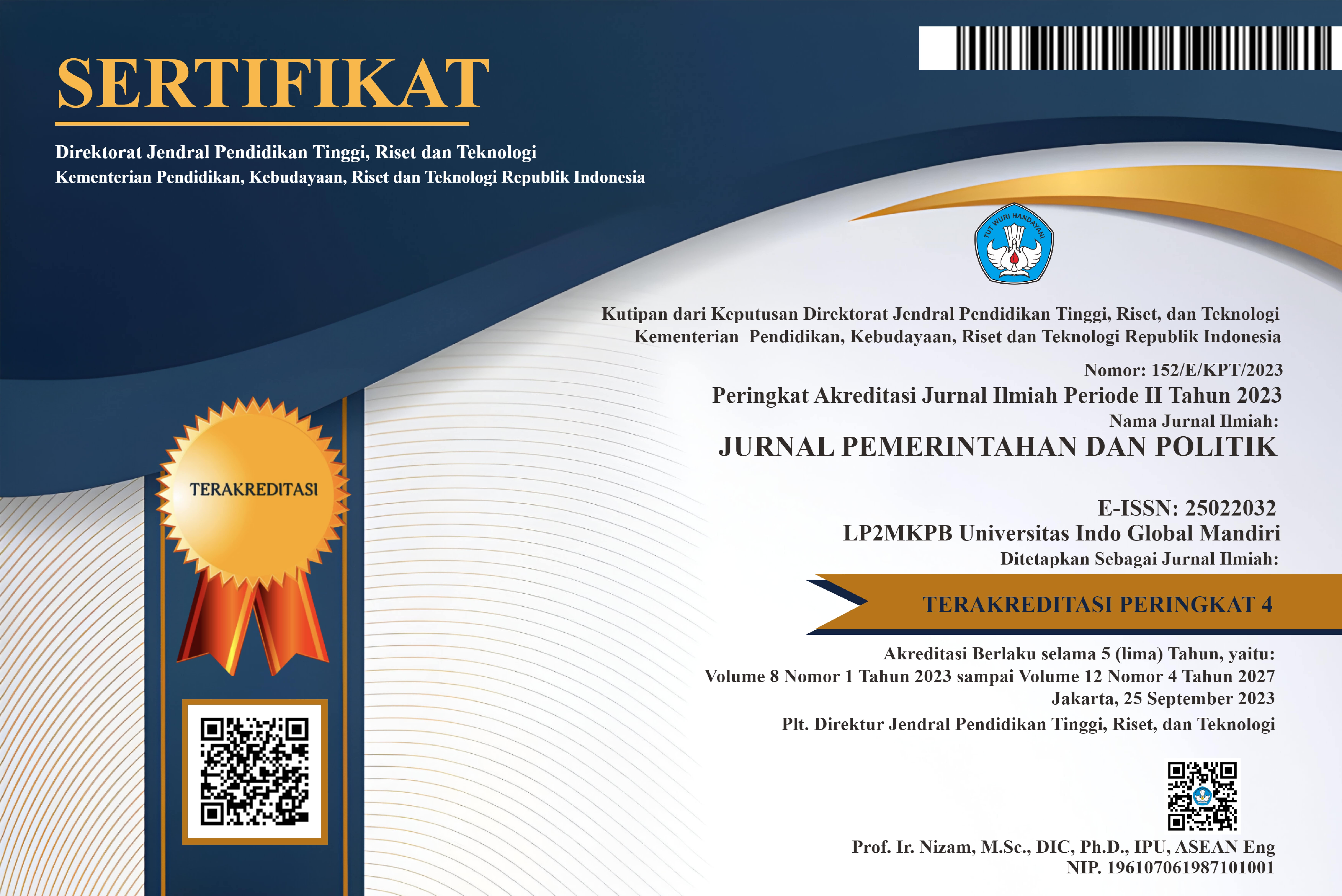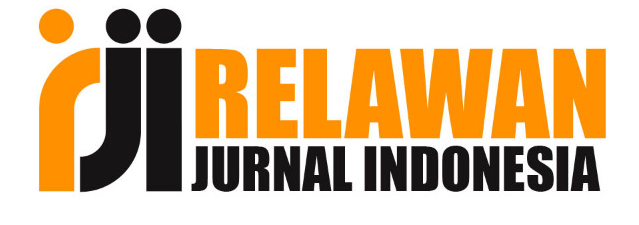Collaborative Governance Dalam Pengelolaan dan Pengembangan Pariwisata di Desa Ngargogondo Kecamatan Borobudur
DOI:
https://doi.org/10.36982/jpg.v7i2.2104Abstract
ABSTRACT
Â
Ngargogondo, a village which is close to the world's tourist attractions, Borobudur Temple, wants to be developed into a tourist village. Some of the tourism potentials of this village include language village tours, Balkondes which provides meeting packages, home stays, off road jeeps tour, vw tours, trails tours, and andong village tours, durian nursery centers, ireng mask dance, and the Krobong craft center. Although there is a lot of potential, the development still not massive enough. The research was conducted with descriptive qualitative method. The research location is in Ngargogondo Village, Borobudur District, Magelang Regency, Central Java. Data collected through FGD, interviews, observation, and documentation. Informants were selected purposively. The results of the study indicated that Ngargogondo Village had an uncoordinated stakeholder network structure. They are Disparpora Magelang Regency, Tidar University, PT. Pegadaian, Ngargogondo Village Government, Pokdarwis, Balkondes, BUMDes, and the Social Community. Stakeholders have contributed according to their respective roles. One thing that is unfortunate is that the existing networked structure does not yet have a unified vision and ideals towards the formation of a tourist village. There are concerns that there will be overlapping or friction between the Pokdarwis, Balkondes, and BUMDes fields of tourism business due to the unclear division of labor if an organized network structure is formed.
Â
Keywords : Collaborative Governance, Ngargogondo Village, Tourism Village
Â
ABSTRAK
Â
Desa Ngargogondo yang dekat dengan obyek wisata dunia yakni Candi Borobudur, ingin dikembangkan menjadi sebuah desa wisata. Beberapa potensi wisata yang dimiliki desa ini antara lain wisata desa bahasa, Balkondes, home stay, jeep off road, vw tour, trabasan trai, wisata desa andong, pisat pembibitan durian, tari topeng ireng, dan pusat kerajibnan krombong. Meskipun terdapat banyak potensi pendukung wisata, namun pengembangannya belum cukup masif. Penelitian menggunakan metode kualitatif deskriptif. Lokasi penelitian di Desa Ngargogondo, Kecamatan Borobudur, Kabupaten Magelang, Jawa Tengah. Pengumpulan data dilakukan dengan teknik FGD, wawancara mendalam, observasi, dan dokumentasi. Informan dipilih secara purposive. Hasil penelitian menunjukkan Desa Ngargogondo memiliki struktur jaringan stakeholder yang tidak terkoordinir dengan baik, yaitu Disparpora Kabupaten Magelang, Universitas Tidar, PT. Pegadaian, Pokdarwis, Balkondes, BUMDes, dan masyarakat itu sendiri. Meskipun masing-masing stakeholder telah menjalankan perannya, namun networked structure yang ada belum memiliki kesatuan visi dan cita-cita menuju terbentuknya sebuah desa wisata. Terdapat kekhawatiran akan adanya tumpang tindih atau terjadi gesekan lahan bisnis wisata di kalangan Pokdarwis, Balkondes, dan BUMDes karena pembagian kerja yang tidak jelasjika suatu saat dibentuk struktur jaringan yang terorganisir.
Â
Kata Kunci : Collaborative Governance, Desa Ngargogondo, Desa Wisata
Â
References
Daftar Pustaka
Alamsyah, D., N. Mustari, R. Hardi, dan A. Mone. 2019. Collaborative Governance dalam Mengembangkan Wisata Edukasi di Desa Kamiri Kecamatan Masamba Kabupaten Luwu Utara. FisiPublik: Jurnal Ilmu Sosial dan Politik. Vol 4(2): 112-127.
Ansell, C., dan A. Gash. 2007. Collaborative Governance in Theory and Practice. Journal of Public Adminsitration Research and Theory. Vol 18(4): 543-471
Diani, R.M dan Y.K.G. Simbolon. 2017. Analisis Penerapan Collaborative Governance dalam Pengelolaan Pariwisata Bencana Lava Tour. Forum Ilmu Sosial. Vol. 44(1): 43-54.
Dwiyanto, A. 2015. Manajemen Pelayanan Publik; Peduli, Inklusif dan Kolaboratif. Yogyakarta: Gadjah Mada University Press.
Emerson, K., T. Nabatchi, dan S. Balogh. 2011. An Integrative Framework for Collaborative Governance. Journal of Public Administration Research and Theory. Vol 22(1): 1-29.
Hartman, C. L., P. Hofman, dan E. R. Stafford. 2002. Environmental collaboration: potential and limits. In T. de Bruijn & A. Tukker (Eds.), Partnership and Leadership: Building Alliances for a Sustainable Future (pp. 21-40). Dordrecht: Boston: Kluwer Academic Publishers. And, Cordery, J.
Hasanah, H. 2016. Teknik-Teknik Observasi. Jurnal at-Taqaddum. Vol. 8(1): 21-46.
Mafaza, A dan K. Setyowati. 2020. Collaborative Governance Dalam Pengembangan Desa Wisata. Jurnal Kebijakan Publik. Vol. 11(1): 1-58.
O’Brien, M. 2012. Review of Collaborative Governance: Factors crucial to the internal workings of the collaborative process. Published by The Ministry for the Environment.
Rosaliza, M.(2015). Wawancara, Sebuah Interaksi Komunikasi Dalam Penelitian Kualitatif. Jurnal Ilmu Budaya, Vol 11 No 2 Februari 2015, pp 71.79.
Sudarmo. 2011. Isu-Isu Administrasi Publik Dalam Perspektif Governance. Surakarta: Smart Media.
Syawal, S.S dan S. Samuda. 2017. Dinamika Collaborative Governance Dalam Festival Legu Gam Sebagai Wisata Kultural Kota Ternate. NATAPRAJA Jurnal Kajian Ilmu Administrasi Negara. Vol 5(2): 145-162.
Yasintha, P.N. 2020. Collaborative Governance Dalam Kebijakan Pembangunan Pariwisata Di Kabupaten Gianyar. Jurnal Ilmiah Dinamika Sosial. Vol. 4(1): 1-23.
Yani, A., J. Saputra, Z. Muhammad, Aiyub., Nazaruddin., T. Aisyah, C. T. Musafira, O. Petege, Rahmat, Miska. 2021. Advances in Social Science, Education and Humanities Research, volume 495
Zaenuri, M. 2014. Mengelola Pariwisata-Bencana: Perlunya Perubahan Paradigma Pengeloaan Pariwisata dari Adaptive Governance Menuju Collaborative Governance. UNISIA, Vol. 36(81): 157-168











